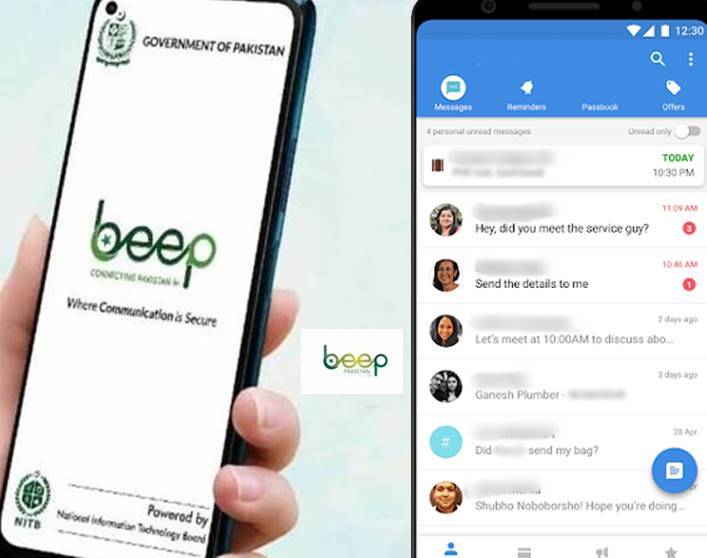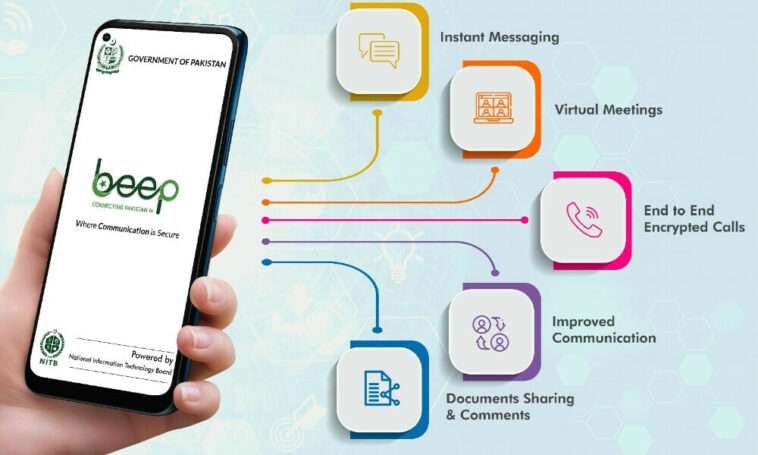With the release of Beep Pakistan, a locally produced messaging application intended to serve as a secure and effective digital communication platform, Pakistan has made considerable progress towards digital independence.
The software has been praised as a substitute for the popular WhatsApp calling and instant messaging platform.
This week, Beep Pakistan was presented by Pakistan’s IT Minister Aminul Haque. It is created in partnership with the National Information Technology Board (NITB) and Pakistan’s IT Ministry. “We can now proudly say Pakistan has a WhatsApp alternative”, the minister said at the launch event. “We have been a bit late … but it is better to be late than never.”

Phases of Launch
Only government employees currently have access to the Made-in-Pakistan app. The software will be gradually rolled out across Pakistan, first with internal government use within the IT ministry and then expanding to other ministries and departments. On its way to completion, the project, which was started in 2020, overcame various obstacles and security clearances. Beep Pakistan will be made available to the general public in a year with improved security and dependability, according to Minister Haque. He expressed optimism that the app would eventually overtake WhatsApp as the favoured alternative in the 241 million-person nation.
Aminul Haque, Pakistan’s minister of information technology, stated at the Beep Pakistan launch that a 30-day trial phase is now being conducted for the nation’s first communication app. After one year, the application will also be available to the general public following a successful trial at the government level.
Features
Strong security standards and a wide range of options, including high-quality audio/video calling, secured messaging, document sharing, and conference capabilities, are a few of Beep Pakistan’s standout features. The Beep Pakistan programme also has capabilities including encrypted messaging, conference calls, rapid audio and video, and document sharing.
The conferencing function of the app, according to Haque, might be used in place of services like Zoom. The application, he continued, aims to secure and improve digital communication between government officials and staff members.

The National Information Technology Board’s CEO, Baber Majid Bhatti, sees the app as an integrated platform that would boost efficiency and collaboration between government agencies.
According to him, “Beep Pakistan is a transformative platform that will revolutionise the way our government operates through seamless collaboration between ministries, offering data-driven decision-making for policymakers, and enhanced services to citizens” on a secure platform. When the app is made available to the general public, citizens can access services and permits online. He compared Beep Pakistan to other apps of a similar nature and declared, “Beep Pakistan is not only a messenger. It serves as a virtual link between several ministries and departments.
Security Aspect
According to officials, Beep Pakistan is ready to offer residents a secure and reliable communication platform because its genesis and source code are rooted in Pakistan. The data for the app will be safely stored in Pakistan. According to NITB CEO Bhatti, “Security is the primary component of the architecture of this app.”
The Pakistan Software Houses Association (P@SHA) chairman, Mohammad Zohaib Khan, praised the domestic app as a significant advancement, particularly in government communication. Khan emphasised its secure data-sharing characteristics and foresaw more feature additions.
The app, in accordance with Haque, attempts to lessen potential cyberattacks so that private government communications are better safeguarded.

Global alternatives to WhatsApp
WhatsApp is the most popular platform for text messaging and photo sharing on a global scale. However, a few nearby options are becoming more well-known.
For instance, Zalo has controlled the messaging market in Vietnam for almost ten years and will surpass rivals like Facebook, Messenger, and Instagram with an 87 percent usage rate in 2022.
BOTIM is the most widely used messaging and calling app in the MENA region.
The most well-liked messaging app in South Korea is KakaoTalk, which is praised for its practicality.
With more than one billion monthly active users, WeChat maintains its dominance in China. The Turkish app BiP, meanwhile, is notable for having complex group conversations and multilingual texting.
Read More: Meta Releases AI Image Creation Model





